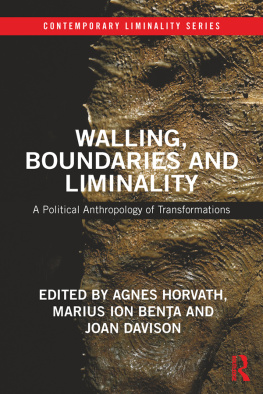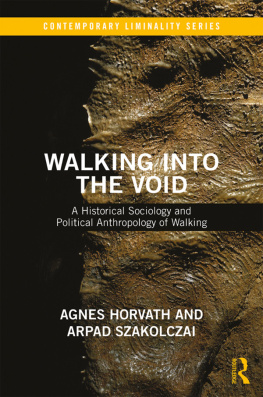
Walling, Boundaries and Liminality
Contemporary challenges related to walls, borders and encirclement, such as migration, integration and endemic historical conflicts, can only be understood properly from a long-term perspective. This book seeks to go beyond conventional definitions of the longue dure by locating the social practice of walling and encirclement in the broadest context of human history, integrating insights from archaeology and anthropology. Such an approach, far from being simply academic, has crucial contemporary relevance, as its focus on origins helps to locate the essential dynamics of this practice, and provides a rare external position from which to view the phenomenon as a transformative exercise, with the area walled serving as an artificial womb or matrix. The modern world, with its ingrained ideas of borders, nation states and other entities, often makes it is very difficult to gain a critical distance and detachment to see beyond conventional perspectives. The unique approach of this book offers an antidote to this problem. Cases discussed in the book range from Palaeolithic caves, the ancient walls of Gbekli Tepe, Jericho and Babylon, to the foundation of Rome, the Chinese Empire, medieval Europe and the Berlin Wall. The book also looks at contemporary developments such as the Palestinian wall, Eastern and Southern European examples, Trumps proposed Mexican wall, the use of Greece as a bulwark containing migration flows and the transformative experience of voluntary work in a Calcutta hospice. In doing so, the book offers a political anthropology of one of the most fundamental yet perennially problematic human practices: the constructing of walls. As such, it will appeal to scholars of sociology, anthropology and political theory.
Agnes Horvath is a political theorist and sociologist. She was an affiliate visiting scholar at Cambridge University, UK, 2011 to 2014, and is a Visiting Research Fellow at University College Cork, Ireland. She is a founding editor of the academic journal International Political Anthropology.
Marius Ion Bena is a sociologist, journalist and playwright. He received his PhD from University College Cork, Ireland, and teaches Broadcasting Journalism at the Babe-Bolyai University in Cluj, Romania.
Joan Davison is Professor of Political Science and a Cornell Distinguished Faculty Member at Rollins College, USA. She has a PhD from the University of Notre Dame and specialises in international relations and comparative politics.
Contemporary Liminality
Series editors:
Arpad Szakolczai, University College Cork, Ireland
Series advisory board:
Agnes Horvath, University College Cork, Ireland
Bjrn Thomassen, Roskilde University, Denmark
Harald Wydra, University of Cambridge, UK
This series constitutes a forum for works that make use of concepts such as imitation, trickster or schismogenesis, but that chiefly deploy the notion of liminality, as the basis of a new, anthropologically focused paradigm in social theory. With its versatility and range of possible uses rivalling and even going beyond mainstream concepts such as system, structure or institution, liminality is increasingly considered a new master concept that promises to spark a renewal in social thought.
In spite of the fact that charges of Eurocentrism or even moderno-centrism are widely discussed in sociology and anthropology, it remains the case that most theoretical tools in the social sciences continue to rely on taken-for-granted approaches developed from within the modern Western intellectual tradition, whilst concepts developed on the basis of extensive anthropological evidence and which challenged commonplaces of modernist thinking have been either marginalised and ignored, or trivialised. By challenging the assumed neo-Kantian and neo-Hegelianfoundations of modern social theory, and by helping to shed new light on the fundamental ideas of major figures in social theory, such as Nietzsche, Dilthey, Weber, Elias, Voegelin, Foucault and Koselleck, whilst also establishing connections between the perspectives gained through modern social and cultural anthropology and the central concerns of classical philosophical anthropology, Contemporary Liminality offers a new direction in social thought.
Titles in this series
7. Walling, Boundaries and Liminality
APolitical Anthropology of Transformations
Agnes Horvath, Mariuslon Benta and Joan Davison
8. The Spectacle of Critique
From Philosophy to Cacophony
Tom Boland
Formore information about this series, please visit: www.routledge.com/sociology/series/ASHSER1435
Walling, Boundaries and
Liminality
A Political Anthropology of
Transformations
Edited by Agnes Horvath,
Marius Ion Bena and
Joan Davison
First published 2019
by Routledge
2 Park Square, Milton Park, Abingdon, Oxon OX14 4RN
and by Routledge
711 Third Avenue, New York, NY 10017
Routledge is an imprint of the Taylor & Francis Group, an informa business
2019 selection and editorial matter, Agnes Horvath, Marius Ion Bena and Joan Davison; individual chapters, the contributors
The right of Agnes Horvath, Marius Ion Bena and Joan Davison to be identified as the authors of the editorial material, and of the authors for their individual chapters, has been asserted in accordance with sections 77 and 78 of the Copyright, Designs and Patents Act 1988.
All rights reserved. No part of this book may be reprinted or reproduced or utilised in any form or by any electronic, mechanical, or other means, now known or hereafter invented, including photocopying and recording, or in any information storage or retrieval system, without permission in writing from the publishers.
Trademark notice: Product or corporate names may be trademarks or registered trademarks, and are used only for identification and explanation without intent to infringe.
British Library Cataloguing-in-Publication Data
A catalogue record for this book is available from the British Library
Library of Congress Cataloging-in-Publication Data
A catalog record has been requested for this book
ISBN: 978-1-138-09641-7 (hbk)
ISBN: 978-1-315-10533-8 (ebk)
Typeset in Times New Roman
by Keystroke, Neville Lodge, Tettenhall, Wolverhampton
This book is dedicated with gratitude and great affection to Sister Amelia and Sister Livia, from Casa Lazzaro, Acquapendente a small town in the Italian region of Lazio who have helped us see walling as perversity of thinking.
Contents
AGNES HORVATH, MARIUS ION BENA AND JOAN DAVISON
PART I
Theorising walling: processes of transformation in history
AGNES HORVATH
ARPAD SZAKOLCZAI
MARIUS ION BENA
PART II
Contemporary examples for transformations through walling
GLENN BOWMAN
EGOR NOVIKOV
HARALD WYDRA
ERIK RINGMAR
MANUSSOS MARANGUDAKIS
ARVYDAS GRIINAS
JOAN DAVISON
AGNES HORVATH, MARIUS ION BENA AND JOAN DAVISON
Agnes Horvath is a political theorist and sociologist. She was an affiliate visiting scholar at Cambridge University, UK, from 2011 to 2014 and is now a Visiting Research Fellow at University College Cork, Ireland. She has a PhD in social and political sciences from the European University Institute in Florence. She is a founding editor of the academic journal
Next page








